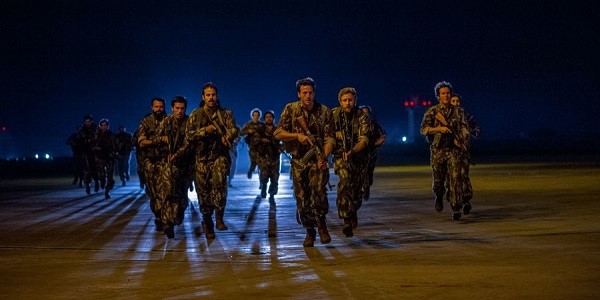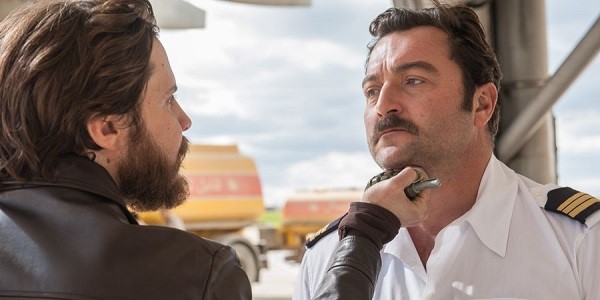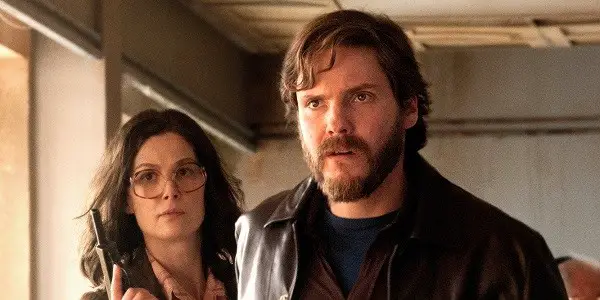7 DAYS IN ENTEBBE: Well-Intentioned But Flawed Hijack Thriller

Lives by the sea in south-east England, with his wife,…
Anyone who saw last year’s documentary Bobbi Jene (by Danish filmmaker Elvira Lind) will be aware of the Batsheva Dance Group, the ferociously talented Tel Aviv-based modern dance company that appears at both the beginning and, more crucially, throughout 7 Days in Entebbe‘s climactic final act.
During that finale, director José Padilha cuts back and forth between one of the Batsheva’s performance pieces and his recreation of ‘Operation Thunderbolt’, the famous 1976 raid carried out by Israeli forces against hijackers holding hostages at Uganda’s Entebbe airport. I guess the idea is to show that the military operation was very much a performance too; drilled and honed to professional perfection. It was also pure theatre, Israel demonstrating to a watching world what happens to those foolish enough to abscond with a plane-load of its citizens.
However, whilst I’m sure there are any number of films with which the inclusion of the Batsheva’s work could improve immeasurably, 7 Days in Entebbe – or just Entebbe, to use its shorter British title– really isn’t one of them. Sure, as a way of differentiating his movie from the hoary old likes of Raid On Entebbe (1976) and Victory At Entebbe (1976), it’s an audacious gambit. But the film spends 90 minutes building tension and then kind of blows it on an art-house flourish it really doesn’t need, nor which adds anything to the narrative. In fact, it obstructs the telling of the story, which is a shame as, elsewhere, Padilha’s film has plenty to recommend it.
Surprisingly even-handed
7 Days in Entebbe is based on the real-life story of the hijacking by Palestinian and German left-wing militants of an Air France passenger jet en route from Tel Aviv to Paris. With the cooperation of the country’s ruler, Idi Amin (Nonso Anozie), the plane is taken to Uganda and the plan is to force Israel to agree to the release of prisoners (Palestinians, mostly) in exchange for the lives of the 248 men, women and children on board – 83 of them Israelis.
Israel’s government instead launches a highly risky rescue attempt involving a crack task force of around 100 commandos, who were flown thousands of miles to East Africa to free the hostages and kill their captors.

The film focuses mainly on four key figures involved in the week-long stand-off: Wilfried Böse (Daniel Brühl) and Brigitte Kuhlmann (Rosamund Pike), the German hijackers who were members of the Revolutionary Cells group, Israel’s Prime Minister Yitzhak Rabin (Lior Ashkenazi), and his Minister of Defence Shimon Peres (Eddie Marsan). The Palestinian members of the hijack team – Jalil al-Arja (Noof McEwan) and Abdel-Latif Abel-Razek al-Samrai – seem to have been pretty much airbrushed from history and are given short shrift here too (I don’t think the latter appears at all).
Padilha (best known for his work on Netflix’s Narcos and the 2014 Robocop remake) and screenwriter Gregory Burke (’71) set out their stall at the very beginning as captions appear on screen about the hijackers: “They call themselves ‘freedom fighters’, while the Israelis call them ‘terrorists’”. It’s clear 7 Days in Entebbe isn’t here to judge the actions of anyone involved and there will be no ‘heroes and villains’ for us to cheer on or boo and hiss. What it does instead is explore – deftly for the most part – the sheer murky moral mess of the entire situation. Not just the hijacking, but the Israel/Palestine conflict too.
Dead-eyed intensity
7 Days in Entebbe is sometimes clumsy and over-earnest but offers plenty of powerful moments to savour. Brühl’s Böse is a book publisher turned revolutionary and hijacker. The horrible irony of his actions – a German threatening the lives of Jews, barely 30 years after the Holocaust – isn’t lost on him. “I’m not a Nazi” he shouts at one point, but as the lives of the hostages become more precarious, he seems to believe it less and less.
There’s a scene in which he tries to calm an elderly female hostage and, as they talk, notices a number tattooed on her arm, presumably from Auschwitz. In that moment, every doubt he has about the entire operation washes over him. In an effective bit of understatement, Brühl doesn’t make a big deal of it, but it’s clear the revelation has knocked the wind right out of Böse. Padilha wants to see the hijackers as human beings first – even the less sympathetic Kuhlmann (played with dead-eyed intensity by Pike) – and whatever else they might be second.

Elsewhere, Brühl’s character isn’t quite as well served. “I want to throw bombs into the consciousness of the masses,” he says at one point as if he were a naïve student, who’d just read ‘The Communist Manifesto’ for the first time, rather than the experienced and dedicated revolutionary he was. In fact, for every potent line or moment during 7 Days in Entebbe you could probably find another which misfires. The relationship between hawkish Peres and the more conciliatory Rabin is nicely played with fine performances from Marsan and Ashkenazi. But, every now and again, one of them will be given something horribly on the nose to say – like “We can’t afford to negotiate with terrorists, it’s political suicide” – and you cringe a little.
The pair overcome such hurdles though as they warm to the way in which their characters circle each other, setting traps, scoring points. Marsan is a particular delight as Peres, a wily old fox well versed in political sleight of hand. Again, neither man is depicted as saint or sinner; they are flawed human beings backed into an impossible corner where there isn’t really a correct answer. Negotiate with people they consider terrorists and risk future hijacks, or launch an insanely risky black op on a sovereign power, 3,000 miles away?
Inexplicably squeamish
The finale, as the commandos storm the airport terminal at Entebbe, is an oddly bloodless affair, not helped by those previously-mentioned interjections from the Batsheva dancers. 7 Days in Entebbe is a measured, restrained piece of work throughout, one that perhaps doesn’t lend itself to massive explosions or gory scenes. But if there’s one thing the Israel/Palestine conflict is predicated upon, it is violence, and ducking that seems inexplicably squeamish to me, especially here when the number of deaths is a matter of public record.
We also know a quarter of Uganda’s air force was destroyed in the operation, but see little to none of that either – it’s all rather glossed over. I’m left wondering why a film juggling complex politics and big themes, plus the historical reality of a high body count, felt the need to go for a PG-13 certificate (12A here in the UK)?

7 Days in Entebbe concludes with a series of captions that reveal the eventual fates of Peres and Rabin, and serves to make its subtext even plainer – that the only way Israel and Palestine will know peace is by seeing each other as human beings, rather than bitter enemies, and getting round the negotiating table. Only in a world as pock-marked by war and oppression as this one could such a decent, honest sentiment be seen as a provocation.
7 Days In Entebbe: Conclusion
A brave and ambitious film unafraid of wrestling with some very difficult questions, 7 Days in Entebbe is let down by an oddly-executed finale and dialogue that is clunky and expository a bit too often for comfort.
I’m sure some will accuse it of making excuses for terrorism or going easy on the hijackers, but that entirely misses the point. It’s a heartfelt plea for a peaceful, negotiated settlement to a seemingly intractable situation. Naïve? Perhaps. A waste of time? Not a bit of it.
Does Entebbe offer a fresh and challenging take on the infamous raid, or is it a politically correct misfire? Let us know what you think in the comments below…
7 Days in Entebbe is showing in UK cinemas now – for other release dates check here.
Does content like this matter to you?
Become a Member and support film journalism. Unlock access to all of Film Inquiry`s great articles. Join a community of like-minded readers who are passionate about cinema - get access to our private members Network, give back to independent filmmakers, and more.
Lives by the sea in south-east England, with his wife, kids and cats. You are cordially invited to check out his film and comics-flavoured website - andywinter.online - and follow him on Twitter @andywinter1













